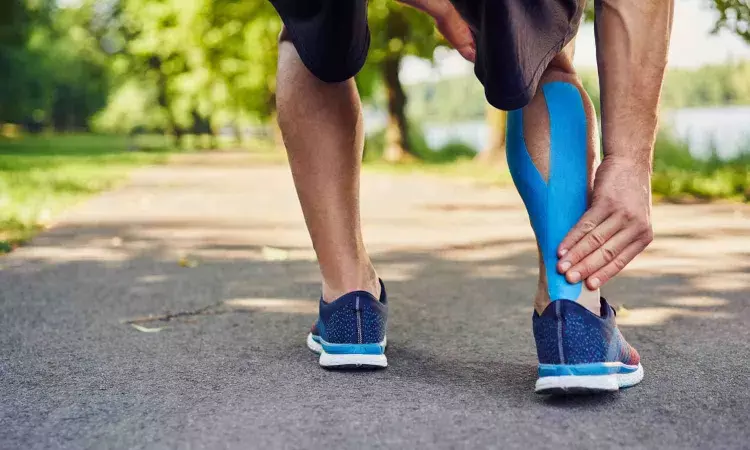- Home
- Medical news & Guidelines
- Anesthesiology
- Cardiology and CTVS
- Critical Care
- Dentistry
- Dermatology
- Diabetes and Endocrinology
- ENT
- Gastroenterology
- Medicine
- Nephrology
- Neurology
- Obstretics-Gynaecology
- Oncology
- Ophthalmology
- Orthopaedics
- Pediatrics-Neonatology
- Psychiatry
- Pulmonology
- Radiology
- Surgery
- Urology
- Laboratory Medicine
- Diet
- Nursing
- Paramedical
- Physiotherapy
- Health news
- Fact Check
- Bone Health Fact Check
- Brain Health Fact Check
- Cancer Related Fact Check
- Child Care Fact Check
- Dental and oral health fact check
- Diabetes and metabolic health fact check
- Diet and Nutrition Fact Check
- Eye and ENT Care Fact Check
- Fitness fact check
- Gut health fact check
- Heart health fact check
- Kidney health fact check
- Medical education fact check
- Men's health fact check
- Respiratory fact check
- Skin and hair care fact check
- Vaccine and Immunization fact check
- Women's health fact check
- AYUSH
- State News
- Andaman and Nicobar Islands
- Andhra Pradesh
- Arunachal Pradesh
- Assam
- Bihar
- Chandigarh
- Chattisgarh
- Dadra and Nagar Haveli
- Daman and Diu
- Delhi
- Goa
- Gujarat
- Haryana
- Himachal Pradesh
- Jammu & Kashmir
- Jharkhand
- Karnataka
- Kerala
- Ladakh
- Lakshadweep
- Madhya Pradesh
- Maharashtra
- Manipur
- Meghalaya
- Mizoram
- Nagaland
- Odisha
- Puducherry
- Punjab
- Rajasthan
- Sikkim
- Tamil Nadu
- Telangana
- Tripura
- Uttar Pradesh
- Uttrakhand
- West Bengal
- Medical Education
- Industry
Testosterone Therapy Linked to Over 7-Fold Increased Risk of Surgically Treated Tendon Ruptures: Study Shows

USA: Patients undergoing testosterone replacement therapy (TRT) may face a significantly higher risk of tendon ruptures that require surgical intervention, according to a new study published in the Orthopaedic Journal of Sports Medicine. The research was led by Dr. Brian Hou and colleagues from Vanderbilt University Medical Center.
Testosterone therapy, often prescribed for men with low testosterone levels, is known to carry several health risks, including cardiovascular problems, sleep apnea, and prostate-related conditions. However, its impact on tendon integrity has been less explored. The latest study aimed to assess whether testosterone therapy contributes to tendon ruptures, particularly of the Achilles, patellar, quadriceps, distal biceps, and pectoralis major tendons.
The team conducted a retrospective analysis using electronic health records from a single medical institution, spanning patients treated between January 1, 2000, and January 1, 2024. Individuals aged 18 to 89 were included. Researchers identified those who were on testosterone therapy and compared them to a much larger group of patients who had not received TRT.
The key findings were as follows:
- 73 out of 46,479 patients on testosterone therapy (0.16%) experienced tendon ruptures that required surgery.
- 811 out of 3,899,355 patients in the non-testosterone group (0.02%) underwent surgical treatment for tendon ruptures.
- Testosterone users were over seven times more likely to have surgically treated tendon injuries compared to non-users (Odds Ratio = 7.53).
- The average age of patients in the testosterone group was 53.6 years, compared to 43.2 years in the non-user group.
- The average BMI in the testosterone group was 33.1 kg/m², while it was 30.6 kg/m² in non-users.
- Differences in both age and BMI between the two groups were statistically significant.
The authors suggest that increased age and BMI may partly explain the elevated rupture risk, but stress that the substantial difference in incidence underscores a strong link between testosterone use and tendon injuries.
"Tendon ruptures can be severely disabling, affecting both athletes and the general population. Our findings suggest that testosterone therapy could be a significant contributor to these injuries, especially when surgical repair is required," noted the researchers.
Given the growing popularity of testosterone replacement in managing hypogonadism and age-related hormonal decline, the study highlights the importance of cautious patient selection and close monitoring. The authors recommend that clinicians consider tendon health and related risk factors when initiating testosterone therapy.
"The study adds to the evolving understanding of testosterone’s broader effects on musculoskeletal health and emphasizes the need for further prospective research to confirm causality and explore preventive strategies," the authors concluded.
Reference:
Hou, B., Bakle, C., Spears, T., Bowman, E., & Luchini, P. (2025). Testosterone Replacement Therapy Increases Odds of Tendon Ruptures Treated Surgically. Orthopaedic Journal of Sports Medicine. https://doi.org/10.1177/2325967125S00009
Dr Kamal Kant Kohli-MBBS, DTCD- a chest specialist with more than 30 years of practice and a flair for writing clinical articles, Dr Kamal Kant Kohli joined Medical Dialogues as a Chief Editor of Medical News. Besides writing articles, as an editor, he proofreads and verifies all the medical content published on Medical Dialogues including those coming from journals, studies,medical conferences,guidelines etc. Email: drkohli@medicaldialogues.in. Contact no. 011-43720751


